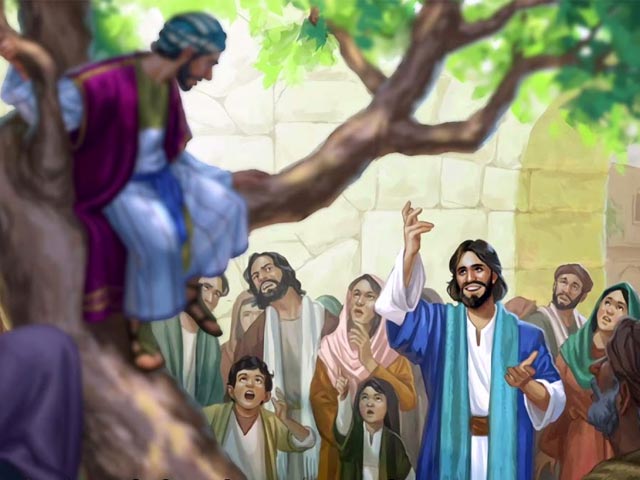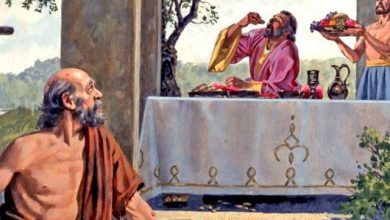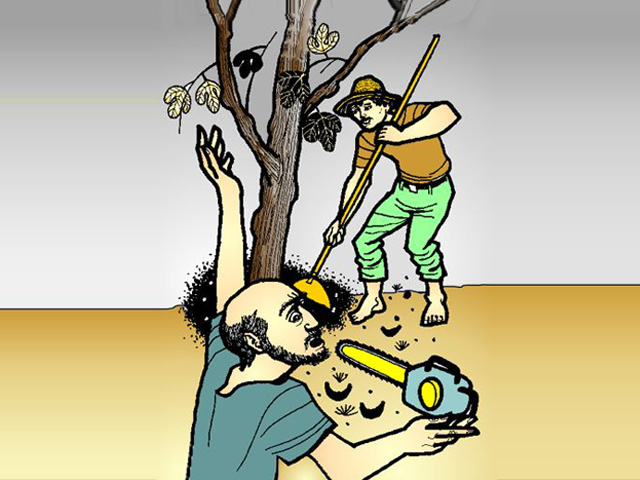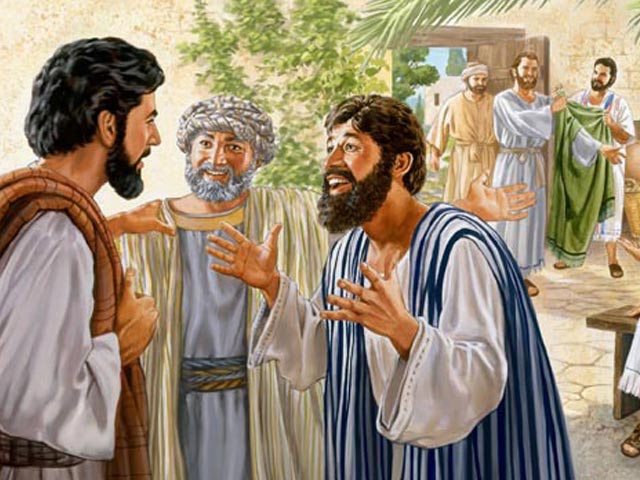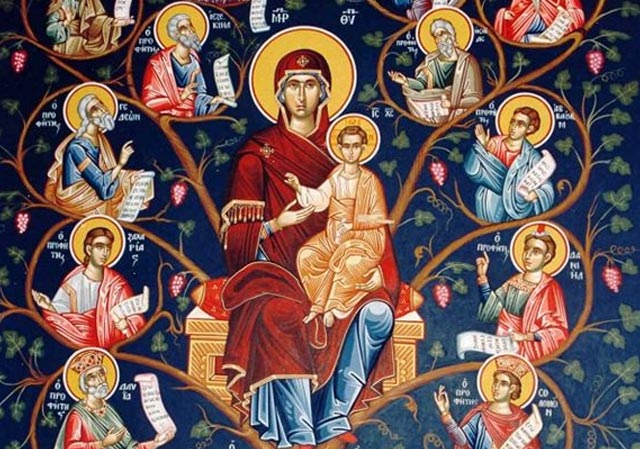Daily Readings Audio | Daily Meditation | March 09, 2020 – March 15, 2020
March 09, 2020
DAILY MEDITATION
by Daily reading & meditation website
Nghe đọc, Click vào đây
Daniel confesses to God, in shame, that the people had indeed sinned by breaking the commandments, and he acknowledges that God is compassionate. In the Gospel, Jesus tells his disciples to be merciful as the Father is: forgive and you will be forgiven. He also tells them: that with which they measure will be measured back to them.
Be merciful, because God has shown us mercy
God does not condemn us according to our sins. As imperfect creatures, we will always fall short of the glory of God, but his mercy endures forever. Therefore, we should be merciful to others when they fault us. No one is sinless; we are all guilty or letting down God and others. Jesus challenges us to forgive extravagantly. Let us pray for our church leaders may the Lord bless their ministry. Amen.
Monday of the Second Week in Lent
Lectionary: 230
Nghe các bài đọc Anh ngữ tại đây
Reading 1 Dn 9:4b-10
“Lord, great and awesome God,
you who keep your merciful covenant toward those who love you
and observe your commandments!
We have sinned, been wicked and done evil;
we have rebelled and departed from your commandments and your laws.
We have not obeyed your servants the prophets,
who spoke in your name to our kings, our princes,
our fathers, and all the people of the land.
Justice, O Lord, is on your side;
we are shamefaced even to this day:
we, the men of Judah, the residents of Jerusalem,
and all Israel, near and far,
in all the countries to which you have scattered them
because of their treachery toward you.
O LORD, we are shamefaced, like our kings, our princes, and our fathers,
for having sinned against you.
But yours, O Lord, our God, are compassion and forgiveness!
Yet we rebelled against you
and paid no heed to your command, O LORD, our God,
to live by the law you gave us through your servants the prophets.”
Responsorial Psalm 79:8, 9, 11 and 13
R. (see 103:10a) Lord, do not deal with us according to our sins.
Remember not against us the iniquities of the past;
may your compassion quickly come to us,
for we are brought very low.
R. Lord, do not deal with us according to our sins.
Help us, O God our savior,
because of the glory of your name;
Deliver us and pardon our sins
for your name’s sake.
R. Lord, do not deal with us according to our sins.
Let the prisoners’ sighing come before you;
with your great power free those doomed to death.
Then we, your people and the sheep of your pasture,
will give thanks to you forever;
through all generations we will declare your praise.
R. Lord, do not deal with us according to our sins.
Verse Before the Gospel Jn 6:63c, 68c
Your words, Lord, are Spirit and life;
you have the words of everlasting life.
Gospel Lk 6:36-38
Jesus said to his disciples:
“Be merciful, just as your Father is merciful.
“Stop judging and you will not be judged.
Stop condemning and you will not be condemned.
Forgive and you will be forgiven.
Give and gifts will be given to you;
a good measure, packed together, shaken down, and overflowing,
will be poured into your lap.
For the measure with which you measure
will in return be measured out to you.”
For the readings of the Optional Memorial of Saint Frances of Rome, please go here.
March 10, 2020
DAILY MEDITATION
by Daily reading & meditation website
Nghe đọc, Click vào đây
In the first reading, the prophet Isaiah calls the people of Sodom and Gomorrah to listen to the Lord’s word, and to turn from evil to good. In the Gospel, Jesus tells his disciples and the crowds to observe all things whatsoever, the scribes and the Pharisees tell you, but do not follow their example.
We are called to repentance.
We, like the people of Sodom and Gomorrah in our first reading, are called to repentance. This is more than saying “I’m sorry!” and moving on. We are called to make certain our words ands actions serve God and others. We must be willing to give ourselves and live in accord with God’s will. Let us pray for those in public authority, may the grace of our merciful God help them in their service to their people. Amen.
Tuesday of the Second Week of Lent
Lectionary: 231
Nghe các bài đọc Anh ngữ tại đây
Reading 1 Is 1:10, 16-20
Hear the word of the LORD,
princes of Sodom!
Listen to the instruction of our God,
people of Gomorrah!
Wash yourselves clean!
Put away your misdeeds from before my eyes;
cease doing evil; learn to do good.
Make justice your aim: redress the wronged,
hear the orphan’s plea, defend the widow.
Come now, let us set things right,
says the LORD:
Though your sins be like scarlet,
they may become white as snow;
Though they be crimson red,
they may become white as wool.
If you are willing, and obey,
you shall eat the good things of the land;
But if you refuse and resist,
the sword shall consume you:
for the mouth of the LORD has spoken!
Responsorial Psalm 50:8-9, 16bc-17, 21 and 23
R. (23b) To the upright I will show the saving power of God.
“Not for your sacrifices do I rebuke you,
for your burnt offerings are before me always.
I take from your house no bullock,
no goats out of your fold.”
R. To the upright I will show the saving power of God.
“Why do you recite my statutes,
and profess my covenant with your mouth,
Though you hate discipline
and cast my words behind you?”
R. To the upright I will show the saving power of God.
“When you do these things, shall I be deaf to it?
Or do you think that I am like yourself?
I will correct you by drawing them up before your eyes.
He that offers praise as a sacrifice glorifies me;
and to him that goes the right way I will show the salvation of God.”
R. To the upright I will show the saving power of God.
Verse Before the Gospel Ez 18:31
Cast away from you all the crimes you have committed, says the LORD,
and make for yourselves a new heart and a new spirit.
Gospel Mt 23:1-12
Jesus spoke to the crowds and to his disciples, saying,
“The scribes and the Pharisees
have taken their seat on the chair of Moses.
Therefore, do and observe all things whatsoever they tell you,
but do not follow their example.
For they preach but they do not practice.
They tie up heavy burdens hard to carry
and lay them on people’s shoulders,
but they will not lift a finger to move them.
All their works are performed to be seen.
They widen their phylacteries and lengthen their tassels.
They love places of honor at banquets, seats of honor in synagogues,
greetings in marketplaces, and the salutation ‘Rabbi.’
As for you, do not be called ‘Rabbi.’
You have but one teacher, and you are all brothers.
Call no one on earth your father;
you have but one Father in heaven.
Do not be called ‘Master’;
you have but one master, the Christ.
The greatest among you must be your servant.
Whoever exalts himself will be humbled;
but whoever humbles himself will be exalted.”
March 11, 2020
DAILY MEDITATION
by Daily reading & meditation website
Nghe đọc, Click vào đây
In the first reading, the people of Judah and Jerusalem plot against Jeremiah. Jeremiah pleads to the Lord for assistance. In the Gospel, Jesus foretells his passion and death. The mother of Zebedee’s sons asks Jesus to exalt her sons in his kingdom, and he declares that he came not to be served, but to serve.
The road to Jerusalem leads to the cross.
As we continue our Lenten journey, we are confronted in today’s readings with the reality of rejection and suffering. We walk with Jesus and his disciples on the road, and to laying down our lives in loving service of others. Let us pray for those who suffer physically or emotionally. God give them comfort and assure them of his love. Amen.
Wednesday of the Second Week of Lent
Lectionary: 232
Nghe các bài đọc Anh ngữ tại đây
Reading 1 Jer 18:18-20
The people of Judah and the citizens of Jerusalem said,
“Come, let us contrive a plot against Jeremiah.
It will not mean the loss of instruction from the priests,
nor of counsel from the wise, nor of messages from the prophets.
And so, let us destroy him by his own tongue;
let us carefully note his every word.”
Heed me, O LORD,
and listen to what my adversaries say.
Must good be repaid with evil
that they should dig a pit to take my life?
Remember that I stood before you
to speak in their behalf,
to turn away your wrath from them.
Responsorial Psalm 31:5-6, 14, 15-16
R. (17b) Save me, O Lord, in your kindness.
You will free me from the snare they set for me,
for you are my refuge.
Into your hands I commend my spirit;
you will redeem me, O LORD, O faithful God.
R. Save me, O Lord, in your kindness.
I hear the whispers of the crowd, that frighten me from every side,
as they consult together against me, plotting to take my life.
R. Save me, O Lord, in your kindness.
But my trust is in you, O LORD;
I say, “You are my God.”
In your hands is my destiny; rescue me
from the clutches of my enemies and my persecutors.
R. Save me, O Lord, in your kindness.
Verse Before the Gospel Jn 8:12
I am the light of the world, says the Lord;
whoever follows me will have the light of life.
Gospel Mt 20:17-28
As Jesus was going up to Jerusalem,
he took the Twelve disciples aside by themselves,
and said to them on the way,
“Behold, we are going up to Jerusalem,
and the Son of Man will be handed over to the chief priests
and the scribes,
and they will condemn him to death,
and hand him over to the Gentiles
to be mocked and scourged and crucified,
and he will be raised on the third day.”
Then the mother of the sons of Zebedee approached Jesus with her sons
and did him homage, wishing to ask him for something.
He said to her, “What do you wish?”
She answered him,
“Command that these two sons of mine sit,
one at your right and the other at your left, in your kingdom.”
Jesus said in reply,
“You do not know what you are asking.
Can you drink the chalice that I am going to drink?”
They said to him, “We can.”
He replied,
“My chalice you will indeed drink,
but to sit at my right and at my left,
this is not mine to give
but is for those for whom it has been prepared by my Father.”
When the ten heard this,
they became indignant at the two brothers.
But Jesus summoned them and said,
“You know that the rulers of the Gentiles lord it over them,
and the great ones make their authority over them felt.
But it shall not be so among you.
Rather, whoever wishes to be great among you shall be your servant;
whoever wishes to be first among you shall be your slave.
Just so, the Son of Man did not come to be served but to serve
and to give his life as a ransom for many.”
March 12, 2020
DAILY MEDITATION
by Daily reading & meditation website
Nghe đọc, Click vào đây
Jeremiah relays the Lord’s message that those who trust in human beings are cursed, whereas those who trust in the Lord are blessed. The Lord knows their hearts and gives according to their deeds. In the Gospel, Jesus tells the parable of the rich man and Lazarus. After they die, the rich man is tormented, and Lazarus is comforted.
Trust in the Lord in all things
The rich man had the best of everything in this life. Lazarus had the worst of everything. We likely fall somewhere in between. Trusting in the Lord in all things is what will affect our own particular judgment on the last day. As the Lord did not know the rich man, he does not know those whose have no hope in him. Let us pray for the Church, may the Spirit’s guidance be our strength. Amen.
Thursday of the Second Week of Lent
Lectionary: 233
Nghe các bài đọc Anh ngữ tại đây
Reading 1 Jer 17:5-10
Thus says the LORD:
Cursed is the man who trusts in human beings,
who seeks his strength in flesh,
whose heart turns away from the LORD.
He is like a barren bush in the desert
that enjoys no change of season,
But stands in a lava waste,
a salt and empty earth.
Blessed is the man who trusts in the LORD,
whose hope is the LORD.
He is like a tree planted beside the waters
that stretches out its roots to the stream:
It fears not the heat when it comes,
its leaves stay green;
In the year of drought it shows no distress,
but still bears fruit.
More tortuous than all else is the human heart,
beyond remedy; who can understand it?
I, the LORD, alone probe the mind
and test the heart,
To reward everyone according to his ways,
according to the merit of his deeds.
Responsorial Psalm 1:1-2, 3, 4 and 6
R. (40:5a) Blessed are they who hope in the Lord.
Blessed the man who follows not
the counsel of the wicked
Nor walks in the way of sinners,
nor sits in the company of the insolent,
But delights in the law of the LORD
and meditates on his law day and night.
R. Blessed are they who hope in the Lord.
He is like a tree
planted near running water,
That yields its fruit in due season,
and whose leaves never fade.
Whatever he does, prospers.
R. Blessed are they who hope in the Lord.
Not so, the wicked, not so;
they are like chaff which the wind drives away.
For the LORD watches over the way of the just,
but the way of the wicked vanishes.
R. Blessed are they who hope in the Lord.
Verse Before the GospelLk 8:15
Blessed are they who have kept the word with a generous heart
and yield a harvest through perseverance.
Gospel Lk 16:19-31
Jesus said to the Pharisees:
“There was a rich man who dressed in purple garments and fine linen
and dined sumptuously each day.
And lying at his door was a poor man named Lazarus, covered with sores,
who would gladly have eaten his fill of the scraps
that fell from the rich man’s table.
Dogs even used to come and lick his sores.
When the poor man died,
he was carried away by angels to the bosom of Abraham.
The rich man also died and was buried,
and from the netherworld, where he was in torment,
he raised his eyes and saw Abraham far off
and Lazarus at his side.
And he cried out, ‘Father Abraham, have pity on me.
Send Lazarus to dip the tip of his finger in water and cool my tongue,
for I am suffering torment in these flames.’
Abraham replied, ‘My child,
remember that you received what was good during your lifetime
while Lazarus likewise received what was bad;
but now he is comforted here, whereas you are tormented.
Moreover, between us and you a great chasm is established
to prevent anyone from crossing
who might wish to go from our side to yours
or from your side to ours.’
He said, ‘Then I beg you, father, send him
to my father’s house,
for I have five brothers, so that he may warn them,
lest they too come to this place of torment.’
But Abraham replied, ‘They have Moses and the prophets.
Let them listen to them.’
He said, ‘Oh no, father Abraham,
but if someone from the dead goes to them, they will repent.’
Then Abraham said,
‘If they will not listen to Moses and the prophets,
neither will they be persuaded
if someone should rise from the dead.’”
March 13, 2020
DAILY MEDITATION
by Daily reading & meditation website
Nghe đọc, Click vào đây
In the first reading, Joseph’s jealous brothers first plan to kill him, but Reuben stops them, intending to save Joseph. Instead, they then sell him as a slave. In the Gospel, Jesus tells the parable of the vineyard in which the owner sends his servants, and then his son, all of whom are killed. The chief priests and Pharisees hear this and, knowing it is about them, attempt to arrest Jesus.
God’s grace is stronger than any sin.
Both readings describe the evil, murderous responses to gifts that other people have received. While we may not relate to these extreme examples of sin, each of us knows what it means to be jealous. Faith transforms these stories of sin, and the stories of our lives, into testimonies of God’s grace. Let us pray for those who are overwhelmed by sin and suffering, may the Lord pour his grace upon them and bring them healing. Amen.
Friday of the Second Week of Lent
Lectionary: 234
Nghe các bài đọc Anh ngữ tại đây
Reading 1 Gn 37:3-4, 12-13a, 17b-28a
Israel loved Joseph best of all his sons,
for he was the child of his old age;
and he had made him a long tunic.
When his brothers saw that their father loved him best of all his sons,
they hated him so much that they would not even greet him.
One day, when his brothers had gone
to pasture their father’s flocks at Shechem,
Israel said to Joseph,
“Your brothers, you know, are tending our flocks at Shechem.
Get ready; I will send you to them.”
So Joseph went after his brothers and caught up with them in Dothan.
They noticed him from a distance,
and before he came up to them, they plotted to kill him.
They said to one another: “Here comes that master dreamer!
Come on, let us kill him and throw him into one of the cisterns here;
we could say that a wild beast devoured him.
We shall then see what comes of his dreams.”
When Reuben heard this,
he tried to save him from their hands, saying,
“We must not take his life.
Instead of shedding blood,” he continued,
“just throw him into that cistern there in the desert;
but do not kill him outright.”
His purpose was to rescue him from their hands
and return him to his father.
So when Joseph came up to them,
they stripped him of the long tunic he had on;
then they took him and threw him into the cistern,
which was empty and dry.
They then sat down to their meal.
Looking up, they saw a caravan of Ishmaelites coming from Gilead,
their camels laden with gum, balm and resin
to be taken down to Egypt.
Judah said to his brothers:
“What is to be gained by killing our brother and concealing his blood?
Rather, let us sell him to these Ishmaelites,
instead of doing away with him ourselves.
After all, he is our brother, our own flesh.”
His brothers agreed.
They sold Joseph to the Ishmaelites for twenty pieces of silver.
Responsorial Psalm 105:16-17, 18-19, 20-21
R. (5a) Remember the marvels the Lord has done.
When the LORD called down a famine on the land
and ruined the crop that sustained them,
He sent a man before them,
Joseph, sold as a slave.
R. Remember the marvels the Lord has done.
They had weighed him down with fetters,
and he was bound with chains,
Till his prediction came to pass
and the word of the LORD proved him true.
R. Remember the marvels the Lord has done.
The king sent and released him,
the ruler of the peoples set him free.
He made him lord of his house
and ruler of all his possessions.
R. Remember the marvels the Lord has done.
Verse Before the Gospel Jn 3:16
God so loved the world that he gave his only-begotten Son;
so that everyone who believes in him might have eternal life.
Gospel Mt 21:33-43, 45-46
Jesus said to the chief priests and the elders of the people:
“Hear another parable.
There was a landowner who planted a vineyard,
put a hedge around it,
dug a wine press in it, and built a tower.
Then he leased it to tenants and went on a journey.
When vintage time drew near,
he sent his servants to the tenants to obtain his produce.
But the tenants seized the servants and one they beat,
another they killed, and a third they stoned.
Again he sent other servants, more numerous than the first ones,
but they treated them in the same way.
Finally, he sent his son to them,
thinking, ‘They will respect my son.’
But when the tenants saw the son, they said to one another,
‘This is the heir.
Come, let us kill him and acquire his inheritance.’
They seized him, threw him out of the vineyard, and killed him.
What will the owner of the vineyard do to those tenants when he comes?”
They answered him,
“He will put those wretched men to a wretched death
and lease his vineyard to other tenants
who will give him the produce at the proper times.”
Jesus said to them, “Did you never read in the Scriptures:
The stone that the builders rejected
has become the cornerstone;
by the Lord has this been done,
and it is wonderful in our eyes?
Therefore, I say to you,
the Kingdom of God will be taken away from you
and given to a people that will produce its fruit.”
When the chief priests and the Pharisees heard his parables,
they knew that he was speaking about them.
And although they were attempting to arrest him,
they feared the crowds, for they regarded him as a prophet.
March 14, 2020
DAILY MEDITATION
by Daily reading & meditation website
Nghe đọc, Click vào đây
The prophet Micah praises God for his mercy: God removes guilt and pardons sin and has compassion on us. In Luke’s Gospel, Jesus tells the parable of the merciful father and the two sons, one who squandered his inheritance, and the other who angrily refused to celebrate his homecoming.
God’s mercy and love are greater than any obstacle or sin.
Both of the readings today remind us of God’s great mercy and love. Despite all the hard-heartedness of the Israelite people. God always pardoned them and welcomed them back. And the son in the parable, who as the younger son didn’t even have a right to any inheritance, is radically forgiven and welcomed home by his father. And so with us, nothing removes us from God’s love for us, and nothing, other than a refusal on our part to repent and return to him, keeps his mercy from us. Let us pray for all of us, may God’s great mercy and love for us increase us in our own virtue of charity and love. Amen.
Saturday of the Second Week of Lent
Lectionary: 235
Nghe các bài đọc Anh ngữ tại đây
Reading 1 Mi 7:14-15, 18-20
Shepherd your people with your staff,
the flock of your inheritance,
That dwells apart in a woodland,
in the midst of Carmel.
Let them feed in Bashan and Gilead,
as in the days of old;
As in the days when you came from the land of Egypt,
show us wonderful signs.
Who is there like you, the God who removes guilt
and pardons sin for the remnant of his inheritance;
Who does not persist in anger forever,
but delights rather in clemency,
And will again have compassion on us,
treading underfoot our guilt?
You will cast into the depths of the sea all our sins;
You will show faithfulness to Jacob,
and grace to Abraham,
As you have sworn to our fathers
from days of old.
Responsorial Psalm 103:1-2, 3-4, 9-10, 11-12
R. (8a) The Lord is kind and merciful.
Bless the LORD, O my soul;
and all my being, bless his holy name.
Bless the LORD, O my soul,
and forget not all his benefits.
R. The Lord is kind and merciful.
He pardons all your iniquities,
he heals all your ills.
He redeems your life from destruction,
he crowns you with kindness and compassion.
R. The Lord is kind and merciful.
He will not always chide,
nor does he keep his wrath forever.
Not according to our sins does he deal with us,
nor does he requite us according to our crimes.
R. The Lord is kind and merciful.
For as the heavens are high above the earth,
so surpassing is his kindness toward those who fear him.
As far as the east is from the west,
so far has he put our transgressions from us.
R. The Lord is kind and merciful.
Verse Before the Gospel Lk 15:18
I will get up and go to my father and shall say to him,
Father, I have sinned against heaven and against you.
Gospel Lk 15:1-3, 11-32
Tax collectors and sinners were all drawing near to listen to Jesus,
but the Pharisees and scribes began to complain, saying,
“This man welcomes sinners and eats with them.”
So to them Jesus addressed this parable.
“A man had two sons, and the younger son said to his father,
‘Father, give me the share of your estate that should come to me.’
So the father divided the property between them.
After a few days, the younger son collected all his belongings
and set off to a distant country
where he squandered his inheritance on a life of dissipation.
When he had freely spent everything,
a severe famine struck that country,
and he found himself in dire need.
So he hired himself out to one of the local citizens
who sent him to his farm to tend the swine.
And he longed to eat his fill of the pods on which the swine fed,
but nobody gave him any.
Coming to his senses he thought,
‘How many of my father’s hired workers
have more than enough food to eat,
but here am I, dying from hunger.
I shall get up and go to my father and I shall say to him,
“Father, I have sinned against heaven and against you.
I no longer deserve to be called your son;
treat me as you would treat one of your hired workers.”’
So he got up and went back to his father.
While he was still a long way off,
his father caught sight of him, and was filled with compassion.
He ran to his son, embraced him and kissed him.
His son said to him,
‘Father, I have sinned against heaven and against you;
I no longer deserve to be called your son.’
But his father ordered his servants,
‘Quickly, bring the finest robe and put it on him;
put a ring on his finger and sandals on his feet.
Take the fattened calf and slaughter it.
Then let us celebrate with a feast,
because this son of mine was dead, and has come to life again;
he was lost, and has been found.’
Then the celebration began.
Now the older son had been out in the field
and, on his way back, as he neared the house,
he heard the sound of music and dancing.
He called one of the servants and asked what this might mean.
The servant said to him,
‘Your brother has returned
and your father has slaughtered the fattened calf
because he has him back safe and sound.’
He became angry,
and when he refused to enter the house,
his father came out and pleaded with him.
He said to his father in reply,
‘Look, all these years I served you
and not once did I disobey your orders;
yet you never gave me even a young goat to feast on with my friends.
But when your son returns
who swallowed up your property with prostitutes,
for him you slaughter the fattened calf.’
He said to him,
‘My son, you are here with me always;
everything I have is yours.
But now we must celebrate and rejoice,
because your brother was dead and has come to life again;
he was lost and has been found.’”
March 15, 2020
DAILY MEDITATION
by Daily reading & meditation website
Nghe đọc, Click vào đây
In their fear and need, the Israelites grumble against Moses and the Lord. God responds by meeting those needs with water flowing from the rock. Saint Paul writes to the Romans that we have been justified by faith through Jesus, his death gives us life. In the Gospel, Jesus meets a Samaritan woman at the well and tells her he is the Messiah.
The goodness and mercy of Jesus is life-giving
Lent, with its disciplines of prayer, fasting and charity, is all about repentance, renew and healing from sin. The Gospel tells of Jesus’ encounter with a woman who had a long history of brokenness and isolation. As she meets Jesus and experiences his life-changing mercy, so too, can we receive new life and living water from the Word and Sacrament in which we encounter Christ. Let us pray for all the church, may Christ, who is the source of living water, continue to quench our thirst for righteousness. Amen.
Third Sunday of Lent
Lectionary: 28
Nghe các bài đọc Anh ngữ tại đây
Reading 1 Ex 17:3-7
In those days, in their thirst for water,
the people grumbled against Moses,
saying, “Why did you ever make us leave Egypt?
Was it just to have us die here of thirst
with our children and our livestock?”
So Moses cried out to the LORD,
“What shall I do with this people?
a little more and they will stone me!”
The LORD answered Moses,
“Go over there in front of the people,
along with some of the elders of Israel,
holding in your hand, as you go,
the staff with which you struck the river.
I will be standing there in front of you on the rock in Horeb.
Strike the rock, and the water will flow from it
for the people to drink.”
This Moses did, in the presence of the elders of Israel.
The place was called Massah and Meribah,
because the Israelites quarreled there
and tested the LORD, saying,
“Is the LORD in our midst or not?”
Responsorial Psalm Ps 95:1-2, 6-7, 8-9.
R. (8) If today you hear his voice, harden not your hearts.
Come, let us sing joyfully to the LORD;
let us acclaim the Rock of our salvation.
Let us come into his presence with thanksgiving;
let us joyfully sing psalms to him.
R. If today you hear his voice, harden not your hearts.
Come, let us bow down in worship;
let us kneel before the LORD who made us.
For he is our God,
and we are the people he shepherds, the flock he guides.
R. If today you hear his voice, harden not your hearts.
Oh, that today you would hear his voice:
“Harden not your hearts as at Meribah,
as in the day of Massah in the desert,
Where your fathers tempted me;
they tested me though they had seen my works.”
R. If today you hear his voice, harden not your hearts.
Reading 2 Rom 5:1-2, 5-8
Brothers and sisters:
Since we have been justified by faith,
we have peace with God through our Lord Jesus Christ,
through whom we have gained access by faith
to this grace in which we stand,
and we boast in hope of the glory of God.
And hope does not disappoint,
because the love of God has been poured out into our hearts
through the Holy Spirit who has been given to us.
For Christ, while we were still helpless,
died at the appointed time for the ungodly.
Indeed, only with difficulty does one die for a just person,
though perhaps for a good person one might even find courage to die.
But God proves his love for us
in that while we were still sinners Christ died for us.
Verse Before the Gospel Jn 4:42, 15
Lord, you are truly the Savior of the world;
give me living water, that I may never thirst again.
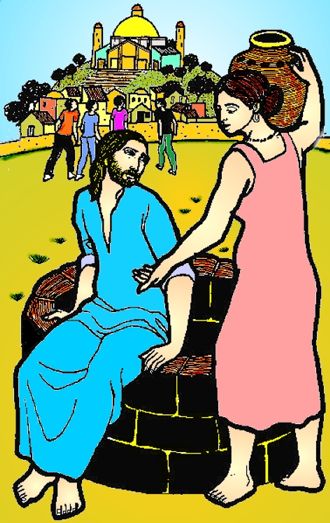 Gospel Jn 4:5-42
Gospel Jn 4:5-42
Jesus came to a town of Samaria called Sychar,
near the plot of land that Jacob had given to his son Joseph.
Jacob’s well was there.
Jesus, tired from his journey, sat down there at the well.
It was about noon.
A woman of Samaria came to draw water.
Jesus said to her,
“Give me a drink.”
His disciples had gone into the town to buy food.
The Samaritan woman said to him,
“How can you, a Jew, ask me, a Samaritan woman, for a drink?”
—For Jews use nothing in common with Samaritans.—
Jesus answered and said to her,
“If you knew the gift of God
and who is saying to you, ‘Give me a drink, ‘
you would have asked him
and he would have given you living water.”
The woman said to him,
“Sir, you do not even have a bucket and the cistern is deep;
where then can you get this living water?
Are you greater than our father Jacob,
who gave us this cistern and drank from it himself
with his children and his flocks?”
Jesus answered and said to her,
“Everyone who drinks this water will be thirsty again;
but whoever drinks the water I shall give will never thirst;
the water I shall give will become in him
a spring of water welling up to eternal life.”
The woman said to him,
“Sir, give me this water, so that I may not be thirsty
or have to keep coming here to draw water.”
Jesus said to her,
“Go call your husband and come back.”
The woman answered and said to him,
“I do not have a husband.”
Jesus answered her,
“You are right in saying, ‘I do not have a husband.’
For you have had five husbands,
and the one you have now is not your husband.
What you have said is true.”
The woman said to him,
“Sir, I can see that you are a prophet.
Our ancestors worshiped on this mountain;
but you people say that the place to worship is in Jerusalem.”
Jesus said to her,
“Believe me, woman, the hour is coming
when you will worship the Father
neither on this mountain nor in Jerusalem.
You people worship what you do not understand;
we worship what we understand,
because salvation is from the Jews.
But the hour is coming, and is now here,
when true worshipers will worship the Father in Spirit and truth;
and indeed the Father seeks such people to worship him.
God is Spirit, and those who worship him
must worship in Spirit and truth.”
The woman said to him,
“I know that the Messiah is coming, the one called the Christ;
when he comes, he will tell us everything.”
Jesus said to her,
“I am he, the one speaking with you.”
At that moment his disciples returned,
and were amazed that he was talking with a woman,
but still no one said, “What are you looking for?”
or “Why are you talking with her?”
The woman left her water jar
and went into the town and said to the people,
“Come see a man who told me everything I have done.
Could he possibly be the Christ?”
They went out of the town and came to him.
Meanwhile, the disciples urged him, “Rabbi, eat.”
But he said to them,
“I have food to eat of which you do not know.”
So the disciples said to one another,
“Could someone have brought him something to eat?”
Jesus said to them,
“My food is to do the will of the one who sent me
and to finish his work.
Do you not say, ‘In four months the harvest will be here’?
I tell you, look up and see the fields ripe for the harvest.
The reaper is already receiving payment
and gathering crops for eternal life,
so that the sower and reaper can rejoice together.
For here the saying is verified that ‘One sows and another reaps.’
I sent you to reap what you have not worked for;
others have done the work,
and you are sharing the fruits of their work.”
Many of the Samaritans of that town began to believe in him
because of the word of the woman who testified,
“He told me everything I have done.”
When the Samaritans came to him,
they invited him to stay with them;
and he stayed there two days.
Many more began to believe in him because of his word,
and they said to the woman,
“We no longer believe because of your word;
for we have heard for ourselves,
and we know that this is truly the savior of the world.”
or
Jn 4:5-15, 19b-26, 39a, 40-42
Jesus came to a town of Samaria called Sychar,
near the plot of land that Jacob had given to his son Joseph.
Jacob’s well was there.
Jesus, tired from his journey, sat down there at the well.
It was about noon.
A woman of Samaria came to draw water.
Jesus said to her,
“Give me a drink.”
His disciples had gone into the town to buy food.
The Samaritan woman said to him,
“How can you, a Jew, ask me, a Samaritan woman, for a drink?”
—For Jews use nothing in common with Samaritans.—
Jesus answered and said to her,
“If you knew the gift of God
and who is saying to you, ‘Give me a drink, ‘
you would have asked him
and he would have given you living water.”
The woman said to him,
“Sir, you do not even have a bucket and the cistern is deep;
where then can you get this living water?
Are you greater than our father Jacob,
who gave us this cistern and drank from it himself
with his children and his flocks?”
Jesus answered and said to her,
“Everyone who drinks this water will be thirsty again;
but whoever drinks the water I shall give will never thirst;
the water I shall give will become in him
a spring of water welling up to eternal life.”
The woman said to him,
“Sir, give me this water, so that I may not be thirsty
or have to keep coming here to draw water.
“I can see that you are a prophet.
Our ancestors worshiped on this mountain;
but you people say that the place to worship is in Jerusalem.”
Jesus said to her,
“Believe me, woman, the hour is coming
when you will worship the Father
neither on this mountain nor in Jerusalem.
You people worship what you do not understand;
we worship what we understand,
because salvation is from the Jews.
But the hour is coming, and is now here,
when true worshipers will worship the Father in Spirit and truth;
and indeed the Father seeks such people to worship him.
God is Spirit, and those who worship him
must worship in Spirit and truth.”
The woman said to him,
“I know that the Messiah is coming, the one called the Christ;
when he comes, he will tell us everything.”
Jesus said to her,
“I am he, the one who is speaking with you.”
Many of the Samaritans of that town began to believe in him.
When the Samaritans came to him,
they invited him to stay with them;
and he stayed there two days.
Many more began to believe in him because of his word,
and they said to the woman,
“We no longer believe because of your word;
for we have heard for ourselves,
and we know that this is truly the savior of the world.”

